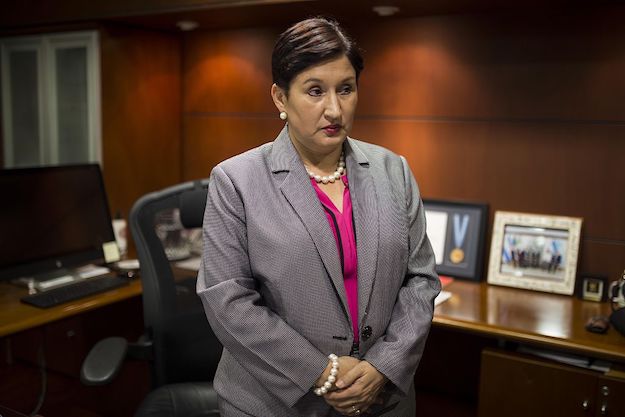In her four years as attorney general, Thelma Aldana has helped make Guatemala’s push against corruption the envy of Latin America, bringing graft accusations against two former presidents, the current mayor of Guatemala City, and a handful of business and political leaders once thought to be untouchable.
Now, as Aldana prepares to step down next month and the search for her replacement enters a critical final stage, the future of the movement she helped sustain is at a crossroads.
“There is a sense those gains could be lost,” said Adriana Beltrán, who follows Central America for the Washington Office on Latin America, a think tank. “There’s still a ways to go in terms of being able to consolidate changes, especially in the public prosecutor’s office.”
On April 16, fifteen members of a judicial selection committee voted on a short list of six candidates from which President Jimmy Morales will pick Aldana’s replacement. The contentious process has pitted elites threatened by Guatemala’s historic crackdown against reformers who worry a less zealous attorney general could squander the fragile progress of recent years.
Though criticized for being prone to outside influence, the selection committee seemed to give a slight edge to reformers when it discarded the most outwardly controversial contenders to fill Aldana’s seat.
Among those cut was Ranulfo Rafael Rojas, a Supreme Court judge who in 2017 voted to uphold Morales’ presidential immunity in the face of corruption allegations by Aldana’s Public Ministry and CICIG, a UN-backed body that has aided investigations. Whatever the judicial merits of his decision, Rojas’ candidacy drew particular ire from civil society as Monday’s vote drew near. In the end, he received just two favorable votes from the committee; at least 10 were required to qualify for the short list.
“The process went better than we expected,” said Gabriel Wer, a founder of JusticiaYA, one of several civil society groups that has advocated for transparency in the selection process using the hashtag #fiscalintachable, or “impeccable attorney general.”
Rojas was one of a handful of contenders considered close to Morales, who in recent months has beat back allegations that he took $900,000 in illegal campaign contributions when he ran for president in 2015. In August, shortly after those accusations came to light, Morales tried unsuccessfully to expel the Colombian prosecutor in charge of CICIG, Iván Velásquez. Morales’ son and brother, meanwhile, are facing fraud charges – a case that, activists believe, a friendly attorney general might try to derail.
The president and his family members deny wrongdoing. But the apparent attempts to stymie the CICIG have led activists to believe that Morales could have his own interests in mind when he selects Aldana’s replacement.
“Morales has a huge conflict of interest in this process,” said Wer.
The methods and composition of the committee that voted on the short list have also come under harsh criticism in recent weeks. At the center of concern is the fact that law school deans are automatically given a seat on the committee. A recent report by InSight Crime suggests that a proliferation of Guatemalan law schools – there are now 12 in the country, some with little academic program to speak of – is the result of efforts by business and political elites to gain influence over the selection process.
The committee was similarly criticized in 2014, when then-Attorney General Claudia Paz y Paz was kept off the short list through what many believed was manipulation by outside interests. Paz y Paz had earned international praise – and plenty of enemies – thanks to her involvement in a number of high-profile human rights cases, including the prosecution of former President Efraín Ríos Montt.
Likely as a result, few Guatemalans expected much from Aldana when she was selected in 2014. Though an accomplished jurist, many – perhaps including then-President Otto Pérez Molina – imagined Aldana would keep the Public Ministry’s prosecutorial attention on violence against women, her area of expertise, and drop the focus on corruption and impunity. That turned out not to be the case; she played a central role in uncorking the La Linea corruption case that led to Pérez Molina’s resignation in 2015.
“(Aldana) was a pleasant surprise,” said Lorena Escobar of the Association for Research and Social Studies (ASIES), a think tank based in Guatemala that closely monitors the judicial system. “She was expected to play an administrative role. But she took things further than I could have expected.”
Aldana’s successor is unlikely to fly under the radar in similar fashion. Thanks in part to televised interviews with the candidates and widespread media coverage throughout the selection process, a broad sector of the general public is tuned in to the significance of the coming attorney general decision.
This time, the process has run more smoothly than in 2014, said Escobar.
“We’ve improved our ability to apply judicial instruments, and there has been greater public buy-in,” she said.
Escobar noted that sectors of the public that hadn’t paid attention in the past – including student groups and civil society organizations born out of popular unrest that led to the resignation of Pérez Molina – have joined others, like indigenous groups, in putting pressure on public officials to keep the process above board.
While that pressure, including a street protest on April 12, seems to have had a positive effect, there are still risks that the selection process will turn against proponents of reform. Wer, for example, expressed reservations about María Consuelo Porras, a finalist who critics believe may ease off from pursuing Morales if she is selected.
But unless last-minute objections prohibit Porras or another of the finalists from moving forward (a possibility, as a final review of the candidates’ eligibility could drag out until the end of the month), by May 14 Morales will have named Aldana’s successor from the current list of six.
In the meantime, Wer said he and his colleagues will stay active as the selection process comes to a close; JusticiaYA plans to publish profiles and organize a forum for the six final candidates.
“We’re in a crucial moment for the anti-corruption cases and investigations,” said Wer. “We’ll keep up the pressure until we get an attorney general who is beyond reproach.”
—
Russell is AQ’s correspondent in Mexico City




